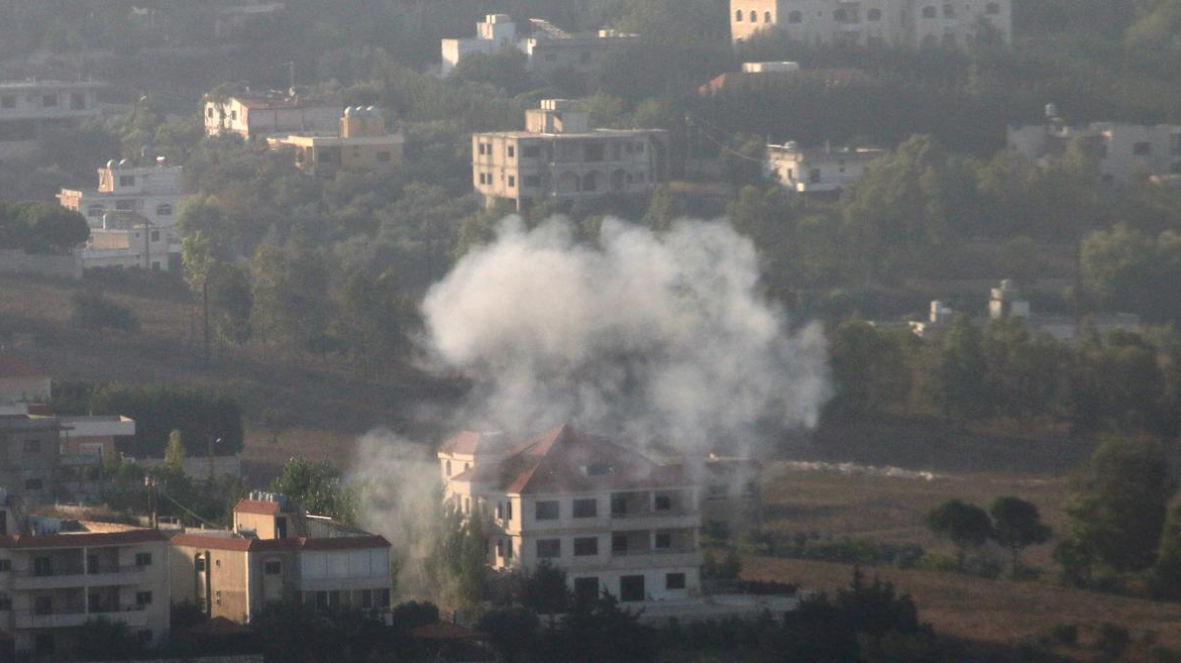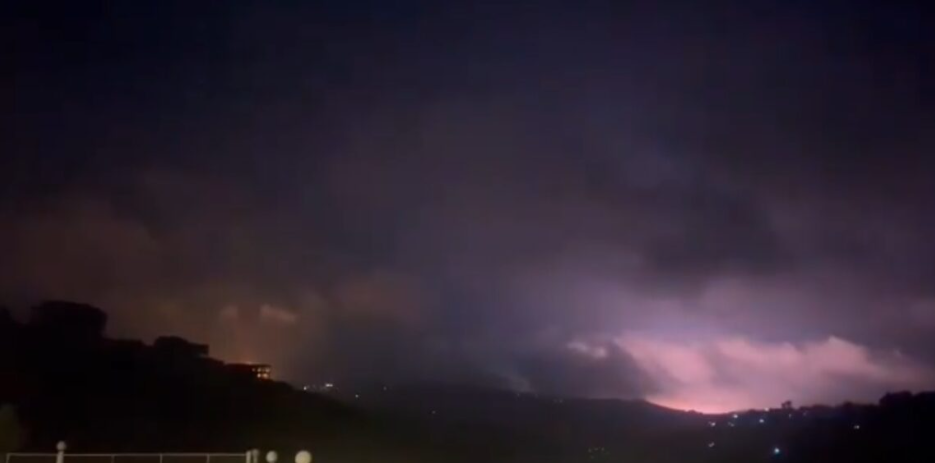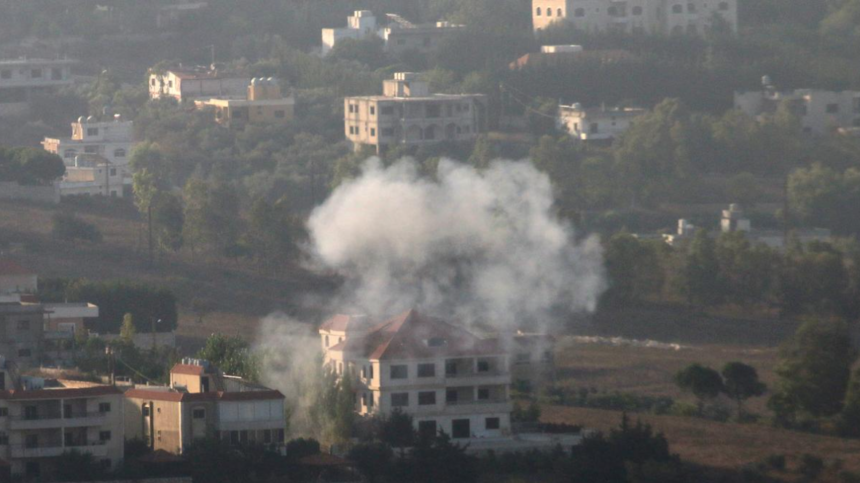Escalating Tensions: Israel Strikes Lebanon:-
Escalating Tensions conflict between Israel and Hezbollah, the powerful Lebanese militant group, has long been a source of instability in the Middle East. This complex and volatile relationship, shaped by decades of hostility, regional alliances, and ideological differences, frequently threatens to ignite into full-scale war. Recently, tensions have once again escalated as Israel launched strikes on Lebanon in response to what it described as a “large-scale” attack threat from Hezbollah. The Israeli military’s stern warning to civilians in southern Lebanon, coupled with its assertion that Hezbollah was preparing for significant assaults on Israeli territory, underscores the fragile nature of peace in this region and the ever-present risk of conflict.
Background: The Israel-Hezbollah Conflict
Hezbollah, a Shia militant group and political party based in Lebanon, was founded in the early 1980s with support from Iran. Its emergence was a response to Israel’s invasion of Lebanon in 1982, and the group has since grown into a formidable force, both militarily and politically. Hezbollah’s primary goals include resisting Israeli occupation of Lebanese territory and opposing Western influence in the Middle East, particularly that of the United States.
Over the years, Hezbollah has engaged in numerous conflicts with Israel, the most significant being the 2006 Lebanon War. This month-long conflict resulted in widespread destruction in Lebanon and northern Israel, as well as significant loss of life on both sides. Since then, although there have been periodic skirmishes and exchanges of fire, a fragile and uneasy ceasefire has mostly prevailed.
However, the underlying tensions have never fully dissipated. Hezbollah’s continued military buildup, its involvement in the Syrian Civil War on behalf of the Assad regime, and its close ties to Iran have kept the group at the forefront of Israeli security concerns. Israel, for its part, has consistently viewed Hezbollah as one of its most significant threats, particularly given the group’s extensive rocket arsenal, which is capable of striking deep into Israeli territory.  for more information click on this link
for more information click on this link
The Recent Escalation: Israeli Strikes on Lebanon
The latest round of tensions erupted when the Israeli military claimed that Hezbollah was preparing for large-scale attacks on Israeli territory, particularly in the northern regions near the Lebanese border. According to Israeli intelligence, Hezbollah was allegedly planning to launch a series of coordinated assaults that could include rocket barrages, cross-border raids, and possibly drone strikes.
In response, Israel launched a series of preemptive strikes on Hezbollah positions in southern Lebanon. The Israeli Air Force targeted a range of sites, including suspected weapons depots, training camps, and observation posts used by Hezbollah operatives. The strikes were intended not only to disrupt Hezbollah’s preparations but also to send a clear message that Israel would not tolerate any aggression against its territory.
The Israeli military also issued a stark warning to residents of southern Lebanon, urging them to distance themselves from Hezbollah installations and avoid areas that might be targeted in future strikes. “We are monitoring Hezbollah’s preparations to carry out large-scale attacks on Israeli territory near your homes. You are in danger,” the military’s statement read, highlighting the potential for civilian casualties in the event of further escalation.
Hezbollah’s Response and Regional Implications
Hezbollah, unsurprisingly, responded to the Israeli strikes with defiance. The group’s leadership accused Israel of launching unprovoked attacks and vowed to retaliate for any further aggression. Hezbollah’s Secretary-General, Hassan Nasrallah, reiterated the group’s commitment to resisting Israeli occupation and warned that any Israeli attack would be met with a strong response.
The situation is further complicated by the broader regional dynamics involving Iran, Syria, and other actors in the Middle East. Hezbollah’s close ties to Iran are well-documented, with Tehran providing the group with financial support, weapons, and training. Iran’s influence in Lebanon and its backing of Hezbollah are part of its broader strategy to extend its power across the region, creating a so-called “axis of resistance” that also includes the Syrian government and various Shia militias in Iraq and Yemen.
Israel views this axis as a direct threat to its security and has repeatedly taken military action to counter Iranian influence in the region. This includes strikes on Iranian targets in Syria, where Iran has sought to establish a military presence, and now, with the recent escalation, in Lebanon, where Hezbollah remains a central player.
The potential for escalation is significant. Should Hezbollah decide to retaliate against Israel, the situation could quickly spiral into a broader conflict. Israel has made it clear that it will not hesitate to defend its territory, and any major attack by Hezbollah could trigger a large-scale military response. This, in turn, could draw in other regional actors, particularly if Iran chooses to support Hezbollah directly.
The Humanitarian Impact and Civilian Risk
One of the most tragic aspects of the ongoing Israel-Hezbollah conflict is the toll it takes on civilian populations. The recent Israeli strikes on Lebanon have already raised concerns about the potential for civilian casualties, particularly given Hezbollah’s strategy of embedding its military infrastructure within civilian areas.
During the 2006 Lebanon War, thousands of Lebanese civilians were killed or injured, and much of southern Lebanon was devastated by Israeli airstrikes and artillery bombardments. Northern Israel also suffered from Hezbollah rocket attacks, with civilians bearing the brunt of the violence on both sides.
The current escalation risks a repeat of this humanitarian disaster. Southern Lebanon is densely populated, and many of its residents live in close proximity to Hezbollah facilities. Israel’s warning to civilians to avoid these areas is an attempt to mitigate the risk of casualties, but in practice, it may be difficult for people to relocate or avoid danger zones.
Furthermore, any significant conflict between Israel and Hezbollah could lead to a large-scale displacement of people, both within Lebanon and across its borders. The United Nations and other humanitarian organizations have already expressed concern about the potential for a humanitarian crisis if the situation continues to deteriorate.
International Reactions and the Role of Diplomacy
The international community has reacted with concern to the recent escalation between Israel and Hezbollah. The United Nations, the European Union, and various countries have called for restraint on both sides and urged a return to dialogue to prevent a full-scale conflict. However, the prospects for diplomacy remain uncertain, Escalating Tensions given the deep-seated animosities and the complex web of regional alliances involved.
The United States, a staunch ally of Israel, has backed Israel’s right to defend itself but has also called for de-escalation. Washington has long designated Hezbollah as a terrorist organization and has imposed sanctions on the group and its leaders. However, the U.S. has also sought to avoid a broader conflict in the region, Escalating Tensions particularly given the ongoing negotiations with Iran over its nuclear program.
Russia, which has close ties to both Iran and Syria, has also called for restraint. Moscow’s involvement in the Syrian Civil War, Escalating Tensions where it has supported the Assad regime alongside Iran and Hezbollah, gives it a unique position in the region. However, Russia has traditionally sought to maintain good relations with Israel as well and has often played a mediating role in previous conflicts.
The European Union, which has significant economic and political interests in the Middle East, has emphasized the need for a peaceful resolution to the conflict. European countries have provided humanitarian aid to Lebanon and have been involved in diplomatic efforts to stabilize the region. However, the EU’s influence is limited, particularly given the entrenched positions of the parties involved.
Ultimately, the role of diplomacy in resolving the Israel-Hezbollah conflict will depend on the willingness of both sides to engage in dialogue and compromise. This is a challenging prospect, given the deep-seated hostilities and the broader regional context. However, without diplomatic efforts, the risk of a devastating conflict remains high.  for more information click on this link
for more information click on this link
The Long-Term Prospects for Peace
The recent escalation between Israel and Hezbollah highlights the persistent challenges to achieving long-term peace in the Middle East. The conflict is rooted in a complex mix of historical grievances, Escalating Tensions ideological differences, and regional power struggles, all of which make a lasting resolution difficult to achieve.
One of the key obstacles to peace is the ongoing dispute over territory. Hezbollah’s primary justification for its resistance is the presence of Israeli forces in areas that the group considers to be Lebanese territory, Escalating Tensions particularly the Shebaa Farms. Israel, for its part, views Hezbollah’s military buildup as an existential threat and is unwilling to make concessions that could compromise its security.
Another major challenge is the broader regional context, particularly the role of Iran. Tehran’s support for Hezbollah is part of its strategy to project power in the Middle East and to counterbalance Israel and its allies. As long as Iran continues to back Hezbollah, the group is likely to remain a potent force in Lebanon and a persistent threat to Israel.
Additionally, the internal dynamics within Lebanon play a significant role in the conflict. Hezbollah is not just a militant group but also a major political player in Lebanon, with significant influence over the Lebanese government and military. This dual role complicates efforts to disarm the group or to reduce its military capabilities, Escalating Tensions as any move against Hezbollah could have serious political repercussions within Lebanon.
For a long-term peace to be achieved, there would need to be significant changes in the regional dynamics, including a reduction in Iranian influence, a resolution to the territorial disputes, and a political settlement within Lebanon that addresses Hezbollah’s role in the country. These are all difficult and complex challenges that will require sustained diplomatic efforts and a willingness to compromise on all sides.
Conclusion
The recent Israeli strikes on Lebanon in response to Hezbollah’s alleged preparations for large-scale attacks have once again brought the Israel-Hezbollah conflict to the forefront of Middle Eastern politics. This escalation underscores the persistent risks of conflict in the region and the challenges of achieving long-term peace.
The conflict between Israel and Hezbollah is deeply rooted in historical grievances, ideological differences, and regional power struggles, Escalating Tensions making it difficult to resolve. The involvement of external actors, particularly Iran, further complicates the situation and increases the risk of a broader regional conflict.
As the international community calls for restraint and diplomacy, the prospects for peace remain uncertain. The situation highlights the urgent need for a comprehensive and sustained effort to address the underlying causes of the conflict and to find a path to a lasting resolution. Without such efforts, Escalating Tensions the cycle of violence is likely to continue, with devastating consequences for the people of the region. ALSO READ:- Nani on Saripodhaa Sanivaaram: Redefining the Vigilante Genre Without the Savior Complex 2024





